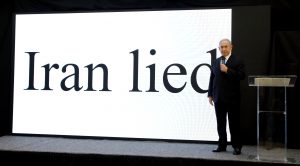
By Steve Holland
WASHINGTON (Reuters) – U.S. President Donald Trump will announce on Tuesday whether he will pull out of the Iran nuclear deal or stay in and work with European allies who have struggled to persuade him that it has halted Iran’s nuclear ambitions.
Trump has consistently threatened to pull out of the 2015 agreement because it does not address Iran’s ballistic missile program or its role in wars in Syria and Yemen, and does not permanently prevent Tehran from developing nuclear weapons.
European leaders have warned that a U.S. withdrawal would undo years of work that led to and sustained a landmark deal that has kept nuclear weapons out of Iran’s hands
But a senior French official doubted Trump had taken heed of European concerns.
“I think in Washington it was quite clear the president was convinced that Trump was heading to a negative decision so we have been preparing more aggressively the hypotheses of a partial or total pullout”, the official said.
Two other European officials also said they expected Trump to pull out of the accord.
Such a move could ratchet up tensions in a region riven with interrelated wars, including the multi-layered conflict in Syria where Iran’s presence has brought it into conflict with Israel.
Reflecting those strains, Iran’s Armed Forces Chief Major General Mohammad Bagheri said Iran’s military power would defuse any threat to Tehran, while Israeli Prime Minister Benjamin Netanyahu accused Iran of deploying “very dangerous weapons” in Syria to threaten Israel.
A decision to quit the deal could also rattle oil markets due to Iran’s role as a major exporter, and critics say it could also harm Trump’s efforts to reach a deal in nuclear talks with North Korea, a prospect he has dismissed.
“This deal … is a factor of peace and stabilization in a very eruptive region,” French Defense Minister Florence Parly told RTL radio.
Trump, in a tweet on Monday, said he would make the announcement at 2 p.m. (1800 GMT) on Tuesday.
Iran suggested its economy would not be hurt whatever happened, but its rial was near record lows against the dollar in the free market as Iranians tried to buy hard currency, fearing financial turmoil if Trump quits the deal.
“We are prepared for all scenarios. If America pulls out of the deal, our economy will not be impacted,” central bank chief Valiollah Seif said on state television.
‘STAND ON OUR OWN FEET’
“One man in one country might create some problems for us for a few months, but we will overcome those problems,” President Hassan Rouhani said. “If we are under sanctions or not, we should stand on our own feet.”
It would be a severe mistake for Iran to stay in the nuclear deal if the United States leaves it, said senior hardline official Mohammad Javad Larijani, head of the Iranian Judiciary’s Human Rights Council, Tasnim news agency reported.
Even before the latest standoff, a raft of business deals including plane purchases have been delayed amid bankers’ concerns that the nuclear deal could unravel or that they could fall foul of U.S. financial controls.
Whatever Trump’s decision, those concerns are unlikely to ease any time soon as the fallout from weeks of uncertainty and the appointment of a more hawkish U.S. foreign policy team expose underlying obstacles, bankers said.
The deal, negotiated during the administration of Trump’s Democratic predecessor, Barack Obama, eased economic sanctions on Iran in exchange for Tehran limiting its nuclear program.
Trump has called it the “worst deal ever negotiated” and he wants Britain, France and Germany – which also signed the pact along with Russia and China – to toughen up the terms.
Under the deal, known as the Joint Comprehensive Plan of Action (JCPOA), the United States committed to ease a series of U.S. sanctions on Iran and it has done so under “waivers” that effectively suspend them.
WAIVERS
International Atomic Energy Agency chief Yukiya Amano has said in Iran his agency had the world’s most robust nuclear verification regime. If the deal failed it would be “a great loss”.
Trump has until Saturday to decide whether to extend the waivers or withdraw and reintroduce sanctions related to Iran’s central bank and Iranian oil exports.
That would dissuade foreign companies from doing business with Iran because they could be subject to U.S. penalties.
Rouhani suggested on Monday that Iran might remain in the nuclear deal even if Trump abandons it and imposes sanctions. But he also warned that Tehran would fiercely resist U.S. efforts to limit its influence in the Middle East.
The Kremlin said on Tuesday a U.S. withdrawal from the nuclear deal would have harmful consequences.
Israel is widely believed to be the only nuclear-armed state in the Middle East, although it neither confirms nor denies possessing atomic weapons.
Financial markets are watching Trump’s decision closely. On Tuesday, oil retreated from 3-1/2 year highs as investors waited for Trump’s statement.
(Additional reporting by Arshad Mohammed in Washington, Sybille de La Hamaide, John Irish and Tim Hepher in Paris, Parisa Hafezi in Ankara, Bozorgmehr Sharafedin in London, Andrew Torchia in Dubai, Writing by William Maclean, Editing by Janet Lawrence)








